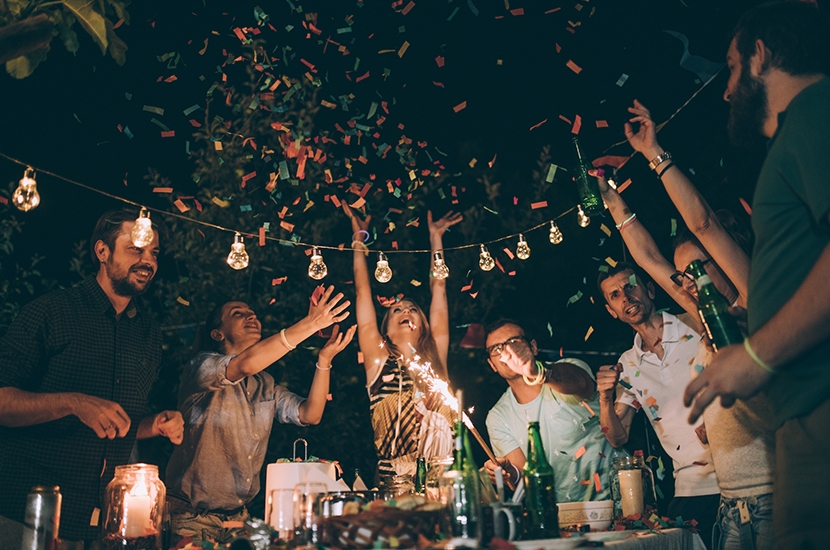The village square is a long and pedestrianised oblong shaded along its length by massive pollarded plane trees. It’s known as ‘le Cours’. There’s a Tabac and a Spar and an ancient fountain that children play on and a shop selling Panama hats. Otherwise le Cours is dominated by the tables and chairs of a dozen or so bars, cafés and restaurants. Viewed from one end at the height of summer, it looks like one great dining hall under the trees. In July and August chic families drive up here from the Mediterranean coast to eat. One recognises the clothes and that forbidding, peculiar aura of new wealth.
Until last week you could have fired a shotgun up the Cours and not hit anyone. The pollarded plane trees wore their usual green summer magnificence but on the ground only the Spar and Tabac were open and the tables and chairs were piled into great dismal stacks.
But last Friday I rose from my sick bed, strapped on my medical support, and was shepherded like a wayward toddler down the hill to the Cours. It was like walking into a fairy tale. The malign spell was overturned and the village was wildly celebrating the reinstatement of their freedom. Or at any rate the version of freedom famously and rather nit-pickingly defined in their constitution as an inalienable right to liberty, fraternity and egality. No masks, no curfew, no early closing, no signed attestations, no social distancing, no pathetic elbow bumping, no hand gel: the world was revolving once again as its recognisable, giddy, noisy, crowded, happy, bourgeois self.
And live televised football in the fascist bar! The hard old faces were upturned avidly towards the giant telly strung by a chain from a tree trunk and some fanatic had dusted off an air horn. Normally I would have put on my cleanest Fred Perry and gone there. But we had a table reserved at a gentle tea shop on the far side, a new venture run by two women friends of ours, one lately emerged from a Buddhist monastery. And tonight they had live music!
The band had already struck up. A trio of veteran blues guys were sitting down in front of the café and playing to the customers on the narrow terrace. Bass guitar, rhythm guitar, keyboard. A Swede, a Hollander, a Belgian. Amplified. Old slow hands with the egotism turned right down to a manageable level that in musicians passes for humility. Moreover a newly approved drinks licence meant wine and beer was on the menu. We sat down at our reserved table to ‘Hey Joe’ and ordered plenty of both to be comfortably going on with.
Straight away I felt a hand on my shoulder. Phillipe — a bachelor of varied experience in other parts of the country, including a disreputable quartier of the capital. Phillipe is unfussy about what’s in his glass and does odd jobs for cash in hand. For a while I tried calling him Phillipe Phillop but nobody, least of all him, thought it amusing so I stopped. He kindly enquired about my health and I invited him to pull up a chair. ‘Do you like the blues?’ I asked. ‘Yes, of course,’ he said. I apologised for asking such a stupid question.
Originally a four at the table, now we were five. Soon we were six, then seven. These last two were reclusive singletons, both of them women, one American, one French, attracted by our table’s Dickensian conviviality and perhaps by our singing together: ‘Hey Joe, where are you going with that gun in your hand?’ The American looked shell-shocked and claimed that this was her first social outing for 15 months. The French woman seemed a little detached. We budged up to make room, asked for extra glasses and told them to help themselves.
I sat between Phillipe and the detached French woman. She was quite old. She hadn’t yet got over the death of her lover, she told me, even though she’d passed away a decade before. After telling me this she rested her head against my chest as though exhausted by grief. Offered wine, she sprang to life and filled her glass dangerously close to the brim with red.
I liked this woman and told her so. I also said something inane about how we might as well enjoy ourselves while we can. To express profound agreement she took my wrist, held it to her bosom, and looked deep into my soul with black featureless eyes. Then she turned her head away and slightly down and projectile vomited over the American woman’s bare right leg. By then the spirit was already moving, however, and not everybody stopped sitting-down dancing and singing to ‘What I’d Say’. And anyway nurse Catriona was already nimbly on her feet to organise the clean-up operation.







Comments